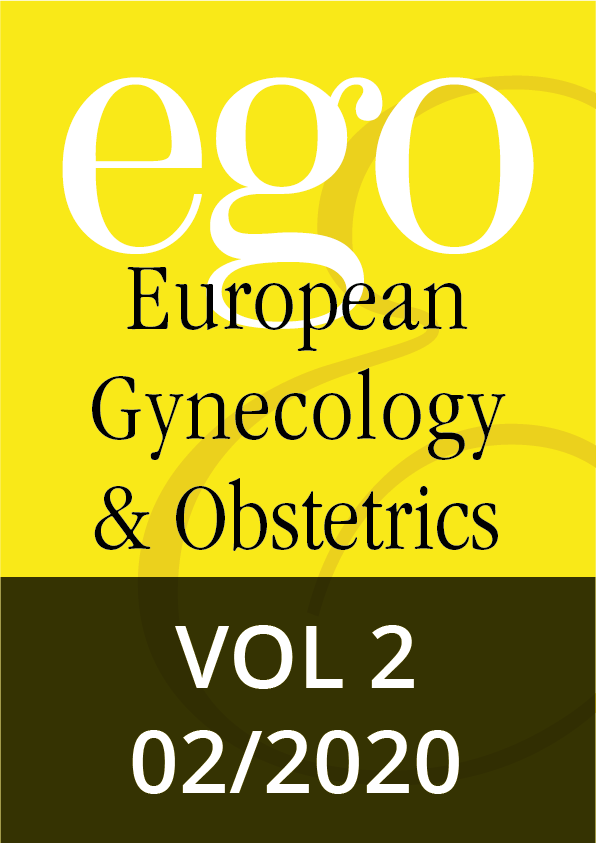Editorial, 03-04 | DOI: 10.53260/EGO.202011
Editorial, 071–072 | DOI: 10.53260/EGO.202021
Short reviews, 073–076 | DOI: 10.53260/EGO.202022
Short reviews, 077–081 | DOI: 10.53260/EGO.202023
Short reviews, 082–089 | DOI: 10.53260/EGO.202024
Short reviews, 090–093 | DOI: 10.53260/EGO.202025
Case reports, 094–097 | DOI: 10.53260/EGO.202026
Case reports, 098–100 | DOI: 10.53260/EGO.202027
Short reviews, 10-15 | DOI: 10.53260/EGO.202013
Case reports, 101–104 | DOI: 10.53260/EGO.202028
Original articles, 105–110 | DOI: 10.53260/EGO.202029
Original articles, 111–115 | DOI: 10.53260/EGO.2020210
Original articles, 116–122 | DOI: 10.53260/EGO.2020211
Original articles, 123–126 | DOI: 10.53260/EGO.2020212
Original articles, 127–131 | DOI: 10.53260/EGO.2020213
Endometriosis and oocyte quality: the role of ROS
Abstract
Background: Endometriosis is one of the most prevalent gynecological diseases in fertile women. It is characterized by the implantation and dissemination of functional endometrial tissue in ectopic positions. It is currently considered one of the main causes of infertility and a main reason for the use of assisted reproduction techniques (ART). Endometriosis-related infertility could be explained by a chronic inflammatory process and oxidative stress occurring at various levels (peritoneal fluid, follicular fluid, uterine endometrium). Purpose: The aim was to compare the clinical results of ART treatment between a group of patients with endometriosis and a control group (women with tubal infertility).
Methods: This was a retrospective observational cohort study; we evaluated 28 assisted reproductive protocols (14 in the endometriosis group and 14 in the control group) performed between October 2018 and March 2019 at the Center of Infertility and Assisted Reproduction, Department of Clinical and Experimental Medicine, University of Pisa. In each woman, clinical aspects were assessed: antral follicle counts (AFC) and levels of anti-Müllerian hormone (AMH), follicle- stimulating hormone, estrogens and progesterone at induction of ovulation, UI of gonadotropin, and stimulation duration. To assess some parameters, the patients with endometriosis were divided in two subgroups: - patients with deep infiltrating endometriosis, who underwent surgery before treatment with ART (number of patients=8) - patients who did not undergo surgery before treatment with ART (number of patients=6)
Results: The control group had significantly higher AMH and AFC levels and used a lower dose of gonadotropin (the significance, in both cases, increased when considering the endometriosis-surgery subgroup). Moreover, there emerged a significant difference in the percentage of grade I embryos (66% in control group vs 26% in endometriosis group).
Conclusion: In women with endometriosis the results of treatment with ART are not yet satisfactory. In fact, in these patients the problem is the inflammatory microenvironment, which affects the reproductive process. Only by understanding and interrupting these mechanisms might ART outcomes be improved.
Keywords: Endometriosis; oxidative stress; infertility; inflammation; oocyte quality.
Citation: G. Artini P.,Pisacreta E.,E. Obino M.,Casarosa E.,Cela V.,R. Genazzani A., Endometriosis and oocyte quality: the role of ROS, EGO European Gynecology and Obstetrics (2020); 2020/02:111–115 doi: 10.53260/EGO.2020210
Published: April 1, 2020
ISSUE 2020/02

Editorial, 03-04 | DOI: 10.53260/EGO.202011
Editorial, 071–072 | DOI: 10.53260/EGO.202021
Short reviews, 073–076 | DOI: 10.53260/EGO.202022
Short reviews, 077–081 | DOI: 10.53260/EGO.202023
Short reviews, 082–089 | DOI: 10.53260/EGO.202024
Short reviews, 090–093 | DOI: 10.53260/EGO.202025
Case reports, 094–097 | DOI: 10.53260/EGO.202026
Case reports, 098–100 | DOI: 10.53260/EGO.202027
Short reviews, 10-15 | DOI: 10.53260/EGO.202013
Case reports, 101–104 | DOI: 10.53260/EGO.202028
Original articles, 105–110 | DOI: 10.53260/EGO.202029
Original articles, 111–115 | DOI: 10.53260/EGO.2020210
Original articles, 116–122 | DOI: 10.53260/EGO.2020211
Original articles, 123–126 | DOI: 10.53260/EGO.2020212
Original articles, 127–131 | DOI: 10.53260/EGO.2020213
